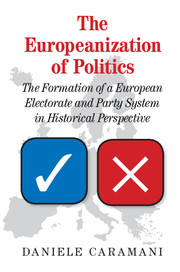 The Europeanization of Politics
The Europeanization of Politics from Part I - Framework
Published online by Cambridge University Press: 05 November 2015
Introduction
The task of this chapter is to identify the dimensions of Europeanization from a broad comparative and historical perspective. Concepts from various integration theories are relevant for an encompassing view of Europeanization. This chapter attempts to bring them together to derive indicators for assessing the degree to which Europeanization processes have taken place over the past 150 years. As “Europeanization” is analyzed historically and intended as referring to “nationalization” processes on a vaster scale, the definition given in this book as long-term convergence between national electorates and party systems in Europe is unavoidably broader as well as focussed differently than most definitions.
This definition is broader first of all in temporal terms as it views Europeanization as a process not necessarily linked to European integration. Convergence between national electorates and party systems may be independent of the constitution of a supra-national level of governance (institutions and policies) and therefore may have taken place before European integration since the 1960s. This definition is broader also insofar as convergence is not necessarily related to EU issues or to a cleavage on European integration. It is therefore distinct from “EU-ization”. The long-term convergence of electorates and party systems may be detected in issues other than EU integration, for example in how environmental issues structure publics in European countries, or in similar anti-immigrant reactions to globalization. This definition is broader, finally, because the causes of Europeanization are identified in factors other than EU integration only. While centralization of competences and coordination of policies at the European level clearly have an impact on the degree to which electorates and party systems homogenize over time, this book includes other factors as well.
Additionally, this definition of Europeanization has a different focus. The focus of this study is on the structuring of mass politics and views Europeanization from an electoral perspective. It is therefore different from work on the impact of EU governance on national policies and administrative structures. While there is work on electorates and party systems in a “European integration perspective”, it is usually a literature limited to the European question, that is favourable versus unfavourable views of integration as expressed by voters either in referenda or through anti-Europe parties, or in the position established parties take on Europe (i.e. Europeanization as politicization of the cleavage on European integration).
To save this book to your Kindle, first ensure [email protected] is added to your Approved Personal Document E-mail List under your Personal Document Settings on the Manage Your Content and Devices page of your Amazon account. Then enter the ‘name’ part of your Kindle email address below. Find out more about saving to your Kindle.
Note you can select to save to either the @free.kindle.com or @kindle.com variations. ‘@free.kindle.com’ emails are free but can only be saved to your device when it is connected to wi-fi. ‘@kindle.com’ emails can be delivered even when you are not connected to wi-fi, but note that service fees apply.
Find out more about the Kindle Personal Document Service.
To save content items to your account, please confirm that you agree to abide by our usage policies. If this is the first time you use this feature, you will be asked to authorise Cambridge Core to connect with your account. Find out more about saving content to Dropbox.
To save content items to your account, please confirm that you agree to abide by our usage policies. If this is the first time you use this feature, you will be asked to authorise Cambridge Core to connect with your account. Find out more about saving content to Google Drive.